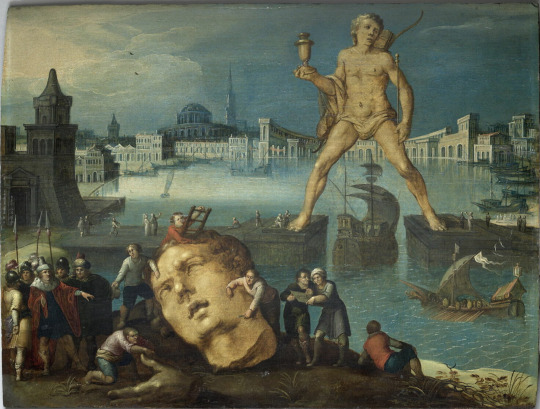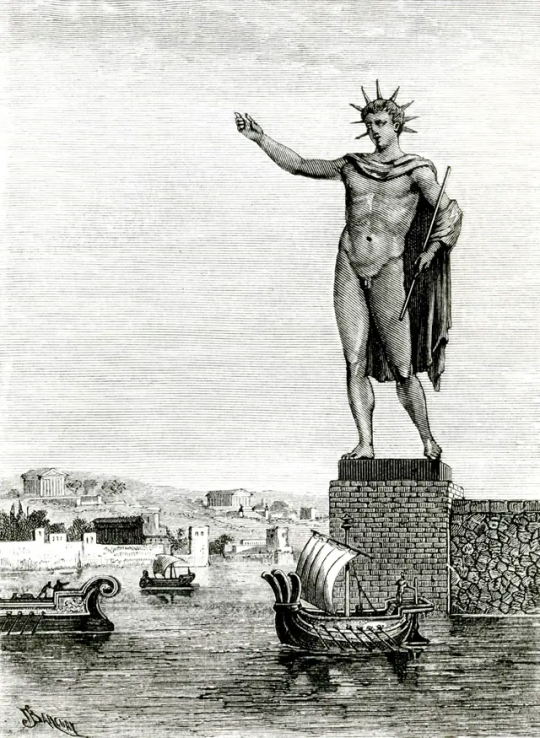Text
.

Limestone sculpture of a woman uncovered near Elche, Spain, 5th-4th century BC
from The National Archaeological Museum, Madrid
3K notes
·
View notes
Text
.

{A gola spalancata!...}
• Inno alla crudeltà
Crudeltà, dea madre, oracolo corrosivo del mio calendario,se tu ami aprirti il ventre senza gridare,e pungerti nei polpacci, e scorticarti la pelle,accecare i tuoi occhi perchè vedano l'inconoscibile,con la curiosità viziosa del più nuovo e del più doloroso, io sono come gli uomini della mia razza il più legittimo figlio, che dorma nel tuo letto osceno. [...]
Nessuno s'accorse se la tua ferocia fosse inumana,poichè parve necessaria. [...] Al tuo richiamo io posso dimenticarmi d'essere stato concepito:sono la creatura perfetta nata da un egoismo.Prima di me non c'è nessuno e con me tutto finisce;nel mio canto c'è la dilatazione di tutto il mio mondo;nel mio grido c'è la disperazione bieca di tutto il mio orgoglio...
[...]
1 note
·
View note
Photo
.

Three Ceremonial Arrowheads, Arms and Armor
66.199: Rogers Fund, 1966; 1984.17: Purchase, David and Dorothy Alexander and Mrs. Ridgeley Hunt Gifts, Bequest of Stephen V. Grancsay, by exchange, and funds from various donors, 1984; 1988.170: Gift of Mr. and Mrs. Ronald S. Lauder, 1988 Metropolitan Mu Medium: Steel, copper alloy
http://www.metmuseum.org/art/collection/search/35794
212 notes
·
View notes
Text
.




1941 Czech Kohout & Spol "Mars" Pistol - 7.65mm
Czechoslovakian "Mars" pistol, chambered in 7.65mm and manufactured by Kohout & Spol in Kdyne in 1941. It is estimated that only about 3,800 of these guns made, but there is some dispute about how many. They were only made until about 1942, when the occupying Germans shut down production. This one is matching and has the proper Czech lion proofs.
22 notes
·
View notes
Text
.

The Colossus of Rhodes
The Colossus of Rhodes was a statue of Helios, the Greek sun God, which stood over the Greek island city Rhodes. Notably known as one of the Seven Wonders of the Ancient World, the Colossus was erected by Chares of Lindos in c. 282 B.C.E. to celebrate the defeat of Demetrius I Poliorcetes, who had besieged the city for over a year.
Made of bronze, the statue was reported to stand at 70 cubits (105-110ft ; 32-33m) tall--about the same height as the Statue of Liberty, and acting as the tallest statue of the ancient world--and took almost twelve years to construct. Presiding over Mandrákion harbour, it is dated back to 1395 C.E. by the writings of an Italian who visited the island that the statue straddled the harbor (see painting above).
Tragically, around 227-225 B.C.E., an earthquake hit the island of Rhodes, snapping the Colossus at the knees. The collapsed statue was left untouched until 653-654 C.E. when *supposedly* Arabian forces, acting under Mu'awiya I, raided Rhodes. Pieces were said to be sold, totaling more than 900 camel loads.

Reconstruction
Ptolemy III offered to help pay towards the reconstruction of this statue, but the Oracle of Delphi made the people of Rhodes believe that Helios was offended, thus the offer met refusal.
Another reason for reconstruction being refused is due to the seismically unstable location Rhodes found itself belonging to. Having multiple devastating earthquakes cemented the unlikeliness that the statue could withstand existing if built again.
Misconception
The misconception towards the Colossus's stance, particularly from medieval interpretations, was disputed by simple explanations in John Lemprière's Bibliotheca Classica (Classical Dictionary). Lemprière states that construction would have blocked the harbor, and when the statue was finally built, builders would've needed to clean everything from the harbor in order to reopen. Additionally presented, when the Colossus met its dismay, it would have blocked the harbor and been left unseen on land (which we know isn't true considering many stories of Rhodes being a tourist destination just to see the fragments of Helios left scattered).
Furthermore, if you apply physics, you'd understand that the weight met with its legs-wide stance would crumple on its own.
The statue of Rhode's patron God is unknown by appearance besides that it may have curly hair and halo of spiked flame due to engravings on Rhodian coins which pictured Helios. The Colossus's pose is disputed, though historians believe Helios hovering his arm near his eyes to block light, attributing this possibility to a nearby temple's relief which shows the God performing the aforementioned action.

Credits
Beginning Piece:
"Le colosse de Rhodes"
by Louis de Caullery
Oil on Panel Painting, before 1622.
Louvre Museum.
Last Piece:
"Colosse de Rhodes"
by Sidney Barclay
Engraving, circa 1875.
Sources Used:
Art In Context
Britannica
Wikipedia (hey, they have good sources listed, I could've lied about what I read and put all of those here instead).

11 notes
·
View notes












